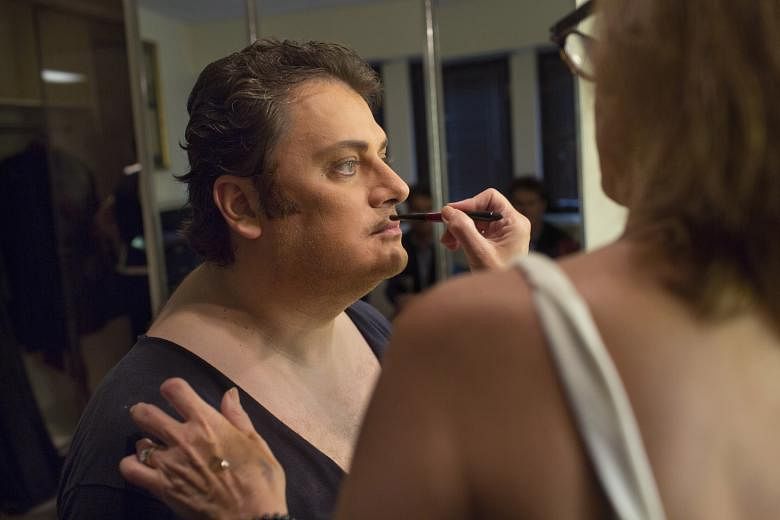NEW YORK • At a dress rehearsal at the Metropolitan Opera, there was something missing when Latvian tenor Aleksandrs Antonenko sang the title role of Verdi's Otello - the stage make-up that used to darken pale singers playing the part.
"The Met breaks tradition and I will be white," says Antonenko.
It was an offhand way of phrasing a seismic shift. That leading opera houses have continued to use blackface, long after minstrel shows have been rejected as racist, may be more surprising to many people than that the practice is being ended by the Met, after 124 years.
This applies to the new production of Otello that opens its 2015-16 season today.
The change comes in a year when the massacre of nine black parishioners at a church in Charleston spurred a national discussion about racism and the power of symbols, and prompted South Carolina officials to remove the Confederate battle flag from the State House grounds after years of resistance. It comes more than a generation after leading theatre companies stopped "blacking up" white actors to play Othello in Shakespeare's play.
But in opera, the practice has continued.
From the Met premiere of Otello in 1891 until its most recent revival in 2013, dark face make-up was de rigueur. Antonenko has sung the role - who is described in the opera, as in the play, as a "Moor"- in dark make-up across Europe.
An American Ballet Theatre performance of Lar Lubovitch's Othello last year, in which Marcelo Gomes wore dark make-up, offended members of the audience.
Opera buffs may not blink at seeing white Otellos in dark greasepaint, viewing it as part of a tradition that has allowed overweight tenors to play starving artists or mature sopranos to be cast as winsome teenagers. The paramount concern has been whether performers had the vocal goods for the roles.
But today's audiences, raised in an increasingly diverse world and accustomed to a style of theatrical naturalism that should look as good in a high-definition close-up as it does from the upper balconies, an Otello in blackface is likely to register somewhere on a scale of awkward to offensive.
Yet, the change has divided opera lovers.
After the Met posted a video excerpt from a rehearsal on its Facebook page, one commenter wrote: "Othello should be in black face". Another suggested that the complainant " live in the 19th century".
If dark make-up is deemed out of bounds for white Otellos, will that also change expectations for how, say, non-Asian sopranos should look or act when singing the title roles in operas? And how should the 19th-century Japan of Butterfly or the fairytale China of Turandot be represented on stage?
Works conceived long ago as exotic spectacles can risk looking uncomfortably like Orientalism, or jumbles of patronising and outdated stereotypes, to modern eyes.
The move away from naturalistic, literal productions - whether by changing their eras or locales, embracing abstract sets or radically reimagining works - gives companies latitude to grapple with these questions. When English National Opera staged Otello without blackface last year, the setting was updated to the early 20th century.
Bartlett Sher, director of the Met's new Otello, said he "didn't really have much agonistes" over the decision not to use make-up on Antonenko. "It never occurred to me, in this day and age, that we would ever consider doing it with the make-up."
Sher said he saw the character as an outsider uncomfortable in Venetian society who is manipulated into a kind of jealous madness that leads to tragedy - all of which can be communicated without make-up.
Placido Domingo, the pre-eminent Otello of the 1980s and 1990s, said in an interview he had always performed in dark make-up and that he saw it as part of his mission to be vocally and dramatically believable. He quoted, from memory, several lines from a quartet in the opera in which an insecure Otello sings about his advancing age and the darkness of his face.
Francesca Zambello, the artistic director of Washington National Opera, said that all the discussion of Otello and make-up highlighted the persistent lack of diversity in opera.
"If I were casting Otello, I would work hard to find a black man who is vocally and dramatically appropriate for the role," she wrote in an e-mail. "But if I could not, I certainly would not present another singer 'blacked up'. The great stories and characters fascinate us because we recognise something of ourselves - for better or for worse - in them and not because of the colour of their skin."
NEW YORK TIMES

